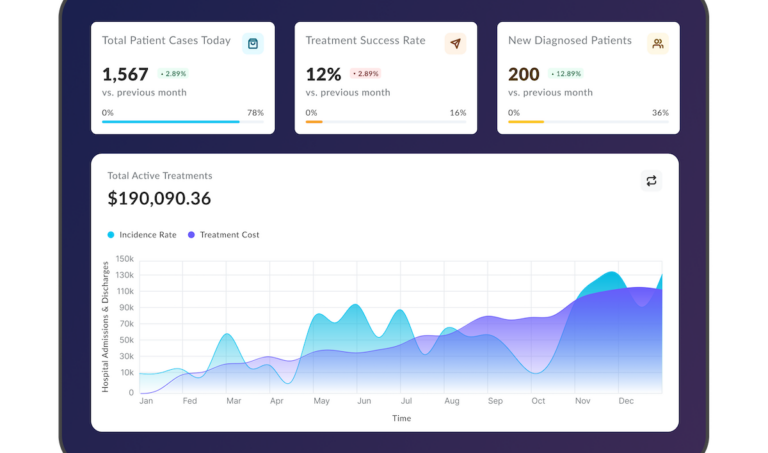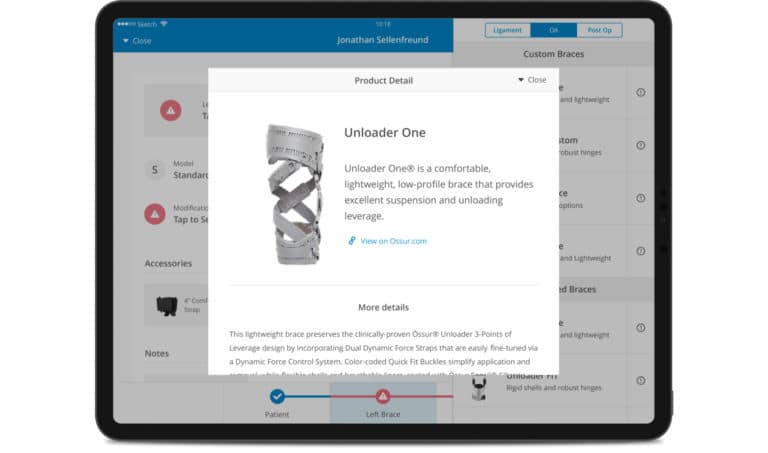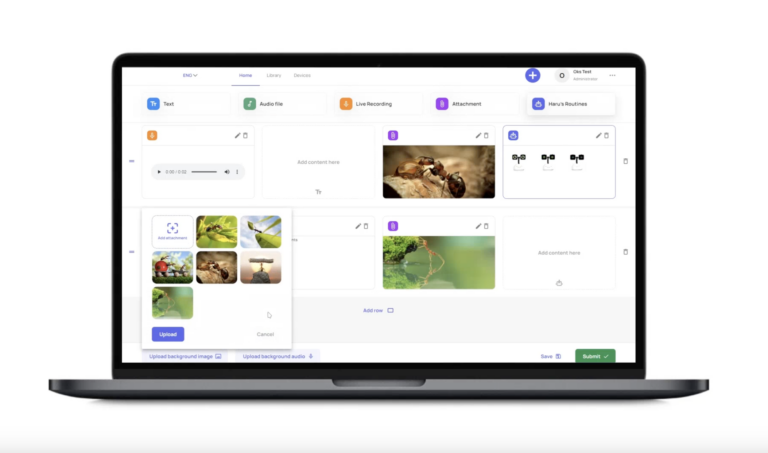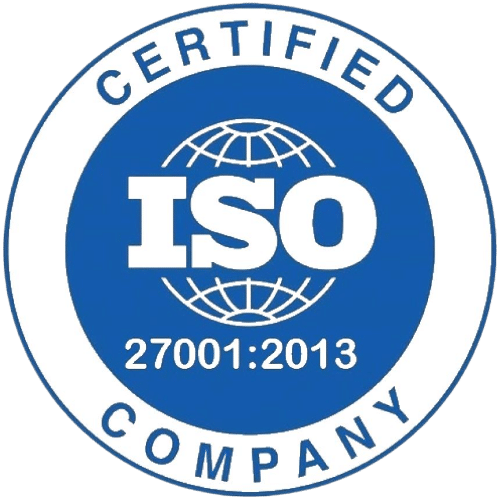How to Build a Winning Engineering Culture: Expert Insights
Updated: June 4, 2025
Why do industry leaders like Google and Spotify consistently outperform their rivals? The answer lies in their robust engineering culture, a factor that drives daily operations, nurtures innovation, and encourages collaboration.
Software engineering culture is not an optional add-on; it is a vital necessity that defines the ethos of successful organizations. It helps you build an environment that fosters creativity, where ideas are born and nourished to maturity, and where teamwork is organically cultivated and not enforced.

We provide companies with senior tech talent and product development expertise to build world-class software. Let's talk about how we can help you.
Contact usSo, how to develop a finely tuned engineering team culture that attracts and retains the brightest minds while promoting growth and mutual respect? Join us as we explore all the essentials and nuances of this invisible yet driving force. Based on our experience, we’ll also offer you practical insights to create a culture where excellence is a standard, not a goal.
Table of Contents
Engineering culture: Hype or necessity?
To answer this question, let’s first define what is engineering culture and what it truly entails. Engineering company culture represents a set of shared values and expectations that govern the behavior of each team member. It’s a framework that promotes a collaborative and high-performance environment where innovation thrives, and collaboration is a natural process.
You should understand that this culture applies to every level of an organization, from software engineers to managerial teams. And this is vital. It also requires nurturing engineering team values that resonate with every individual to encourage them to give their best and work harmoniously towards a common goal. Whether in a startup or a well-established company, the principles of cultural engineering rule, dictating the pace and quality of development.
The necessity of a good engineering culture becomes evident when we consider the adverse effects of its absence. Picture a scenario where a developer consistently fails to meet deadlines, causing a ripple effect of delays and shrinking morale among the team. This situation is a symptom of a deficient engineering culture.
The Importance of a Strong Engineering Culture
Undoubtedly, cultivating a robust engineering culture is essential. In fact, it can tell whether a software development company thrives or falls behind.
Let’s take engineering culture examples of leading companies like Netflix, Spotify, Google, and Facebook. They have showcased the numerous benefits of nurturing collaborative and open-minded values within their teams. By establishing a dedicated development team, they have managed to set industry standards, push the boundaries, and build an environment that fosters innovation.
So, let’s get a quick overview of the major advantages you can gain by building a strong software engineer culture.

- Product Innovation. The right engineering culture encourages creativity and innovation, enabling engineers to think out of the box to solve problems. As a result, the products they build more effectively address client problems.
- Attracting and Retaining Talent. Companies with a remarkable culture of engineering become magnets for talent, drawing in a massive number of applicants annually. This is mainly because individuals are eager to work in spaces where they feel valued and can actively contribute to the organization’s value.
- Career Development. Establishing and nurturing a software engineering culture provides opportunities for career growth and skill development. Companies with a culture that recognizes and rewards employee achievements encourage further personal and professional development.
- Streamlined Processes. A positive culture eliminates cumbersome and redundant processes, promoting team autonomy and fostering ownership from design to implementation.
- Customer Satisfaction. A good engineering culture translates to happy employees who are motivated to design better solutions, ultimately leading to products and services that resonate well with customers, ensuring their satisfaction.
Characteristics of a Winning Engineering Culture
Business leaders who want to create a standout engineering company culture within their teams should nurture autonomy and collective awareness. Below are several characteristics commonly found in thriving engineering teams across numerous organizations:
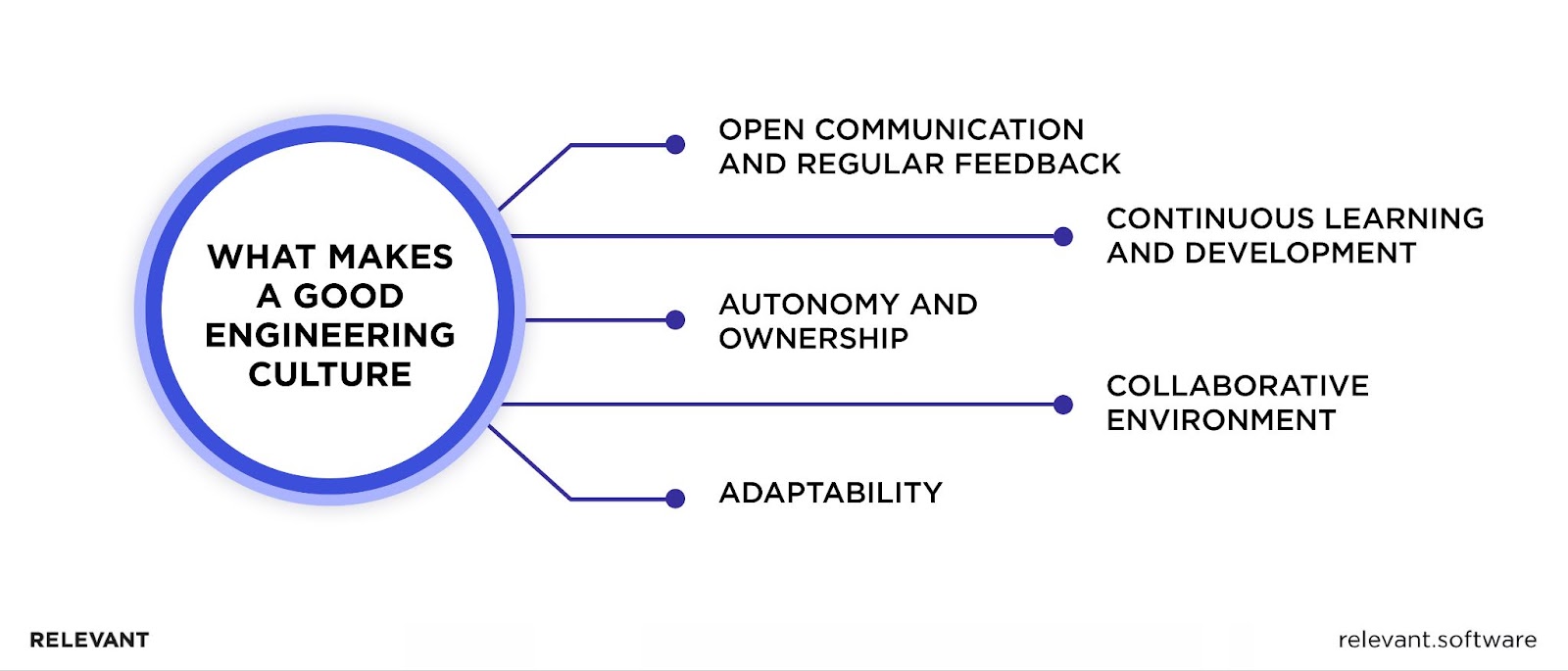
Open Communication and Regular Feedback
A culture that encourages open dialogue allows for the free flow of ideas. Google’s engineering culture, which is a paragon of excellence, has established a workspace where developers feel comfortable sharing their thoughts, a practice that has birthed the Google bots.
Learning and Development
Companies with a winning cultural engineering approach encourage learning and personal growth. Airbnb, for instance, supports career progression through distinct tracks for individual contributors and managers and aids engineers in building their profiles beyond the company.
Autonomy and Ownership
A strong engineering culture grants teams the autonomy to take ownership of their processes from start to end. Spotify, for example, has adopted a unique approach by viewing its teams as jazz bands, emphasizing harmony and collaboration, with each unit working autonomously yet in sync toward a common goal.
Collaborative Environment
Collaboration is key to a robust software engineering culture. Airbnb promotes a collaborative ethos and supports cross-team cooperation that helps streamline processes and drive a harmonious working environment.

Respond to Changes
Being agile and ready to respond to any changes is more crucial today than ever. Given the fluctuating market conditions, engineering teams should be prepared to work in a disruptive and rapidly changing landscape. For instance, companies like Netflix swiftly adapted to the increasing demand for online streaming, constantly refining their strategies to stay ahead. So, your engineering company culture should stimulate teams to keep a close eye on emerging trends and be willing to pivot when necessary.
Steps to Building a Winning Engineering Culture
With a rich background in building robust engineering cultures, assisting software firms in managing distributed teams, and hiring remote developers, we have outlined five essential steps to help you establish a positive engineering culture.
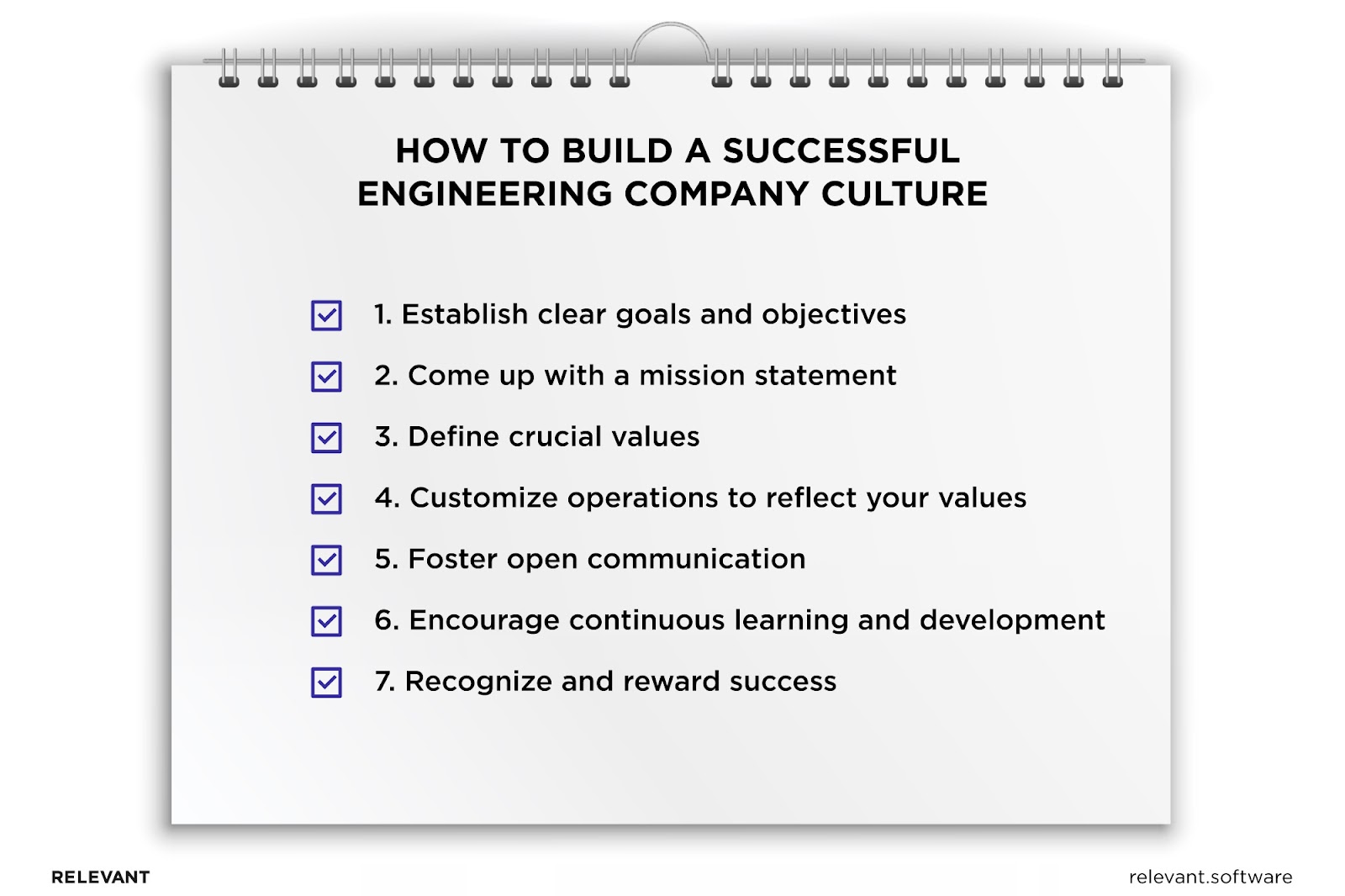
Establish Clear Goals and Objectives
Start with defining what exactly your company aims to achieve. It could be about improving product quality, boosting sales, or developing a new product for a specific market segment. Having a clear set of goals will provide your company with a roadmap and be a rallying point for your team. Thus, you’ll create a unified vision that can guide every project, decision, and strategy and make everyone move in the same direction with a shared purpose.
With clear objectives, teams will get a stronger sense of responsibility and ownership and will work more enthusiastically to meet those targets. Your company objectives will also lay the foundation for your engineering team values.
Come up with a Mission Statement
Your mission statement should be clear and echo your company’s core. Avoid the trap of copying popular cultures just because they are successful. It should be a unique reflection of what matters to your organization – your goals and vision.
Furthermore, a well-thought-out mission statement can help you attract the right talent to your team. Today, software developers look for more than just a paycheck. They seek an organization with values and culture that match their personal values. When your mission statement truly reflects your company’s ethos, it speaks to potential hires and shows what they can expect working in your organization and what you value.
Define Crucial Values
Your mission statement will identify your engineering culture values essential for reaching the defined objectives. Executives should advocate these values and ensure they’re embraced across the entire company, not just in a single team. Depending on what drives your company – your main goal – it should be at the center of your core values.
Customize Operations to Reflect Your Values
To bring those values to fruition, you should introduce mechanisms and practices that support them. First, review existing processes and operations to guarantee hiring the best talents who match the company’s values. Even a single hire can impede or negatively impact a culture you want to build.
Also, check whether your organizational setup needs adjustments to support a culture that helps achieve the defined goals. Evaluate your team structures. You might need to establish cross-functional teams to accelerate the pace of product deliveries.
Furthermore, pay attention to your workspace. The office layout should foster communication and collaboration. Consider adding options for remote work and tactics for managing distributed teams. And remember, it’s a continuous process that demands active engagement from company management. It’s a leadership duty to be the first to embody these values to set a standard for others to follow.
Foster Open Communication
Teamwork and open dialogue should be your main focus if you want to build a strong engineering culture where employees feel comfortable and valued. You should create an atmosphere where dialogue and discussions flow freely, ideas are exchanged without hesitation, and every thought is valued. Such openness will fuel innovation and strengthen bonds within the team. On top of that, it will ensure that everyone is aligned with the company’s objectives and moves towards shared goals.
In an environment where open communication rules, team members are more likely to share their ideas. Such an approach will lead to productive brainstorming, where engineers bring diverse perspectives to develop advanced solutions. Moreover, it builds trust, mutual respect, and cooperative spirit, essential components for any good engineering culture.
Encourage Continuous Learning and Development
Building a resilient software engineering culture goes beyond refining technical skills; it should cultivate a mindset open to fresh perspectives and strategies. Cultural engineering within a company should be such that it promotes a continuous cycle of learning and relearning so your team can adapt swiftly to the relentless pace of technological advancements.
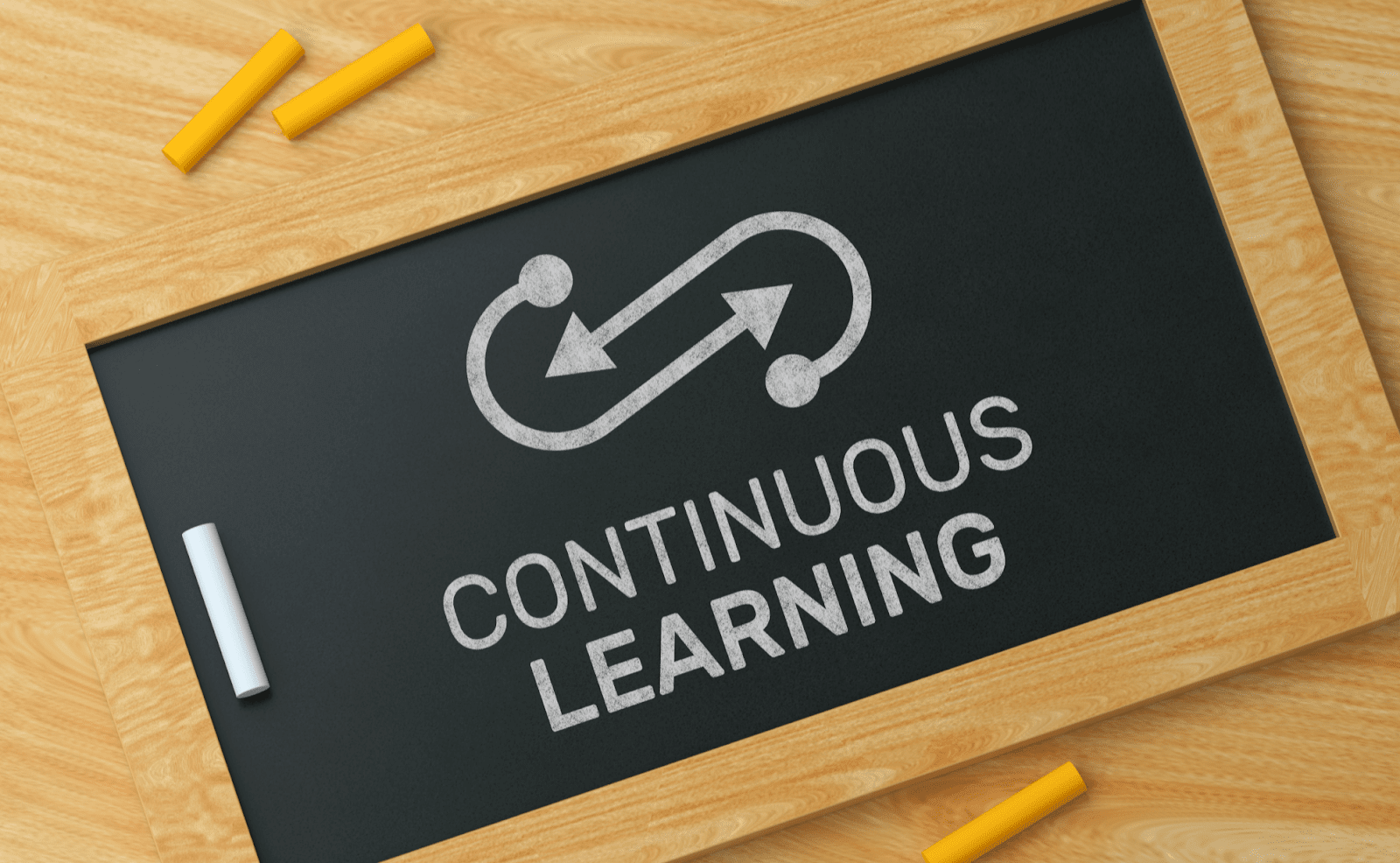
Take a cue from Spotify, a company that enthusiastically adopted and advocated for a strategy to encourage learning continuously. They motivated their engineers to network with peers from tech giants like Google and Netflix for knowledge exchange. Furthermore, Spotify reorganized its engineering teams into smaller and more manageable units to enhance their autonomy and stimulate creative problem-solving. Such an environment keeps the engineers updated with the newest tech developments and helps retain skilled personnel as it offers a fulfilling and growth-oriented workspace.
Recognize and Reward Success
Implementing a reward system aligned with your company’s values and objectives can significantly influence your team’s morale, leading them toward continuous innovation and success. Such a strategy motivates employees to exceed their own expectations, constantly pushing boundaries in their roles. Recognition fuels further innovation and dedication that translates into increased productivity. So, it will help you build a winning engineering company culture where success is a sustained reality.
Challenges in Building a Healthy Engineering Culture
While the aspirations of building a thriving software engineering culture are high, achieving this isn’t a straightforward endeavor, and you can face some hurdles. What are the main pitfalls, and how to overcome them? Let’s find out.
Resistance to Change
In companies entrenched in their ways, resistance to change is one of the most common challenges. Actually, it’s a common human trait. This resistance can originate from different reasons: fear of the unknown, comfort in familiar routines and norms, or concerns about job security. Of course, it will restrain innovation, hinder adaptability, and ultimately impede the company’s growth.

To combat it, leadership should clearly articulate the reasons for change, its benefits, and the way to implement them. Thus, you will eliminate any confusion or misunderstandings, clearly setting the goals. If there are still any concerns among personnel, be open to communicating with them and help address the issues regarding changes and how they will impact their daily routine. By doing so, your staff is more likely to embrace the shift and even become the advocates of it.
Maintaining Consistency
Consistency is what helps you nurture an engineering team culture you’re trying to build. However, maintaining a steady approach can be challenging as your company is dynamic, its priorities can shift, and project requirements or team composition can change. Moreover, communication gaps across different departments and wrong interpretations of the changes add to this challenge and can result in confusion, misaligned objectives, and a fragmented team, all of which will hinder the adoption of a new company engineering culture.
To be consistent in your approach, set clear guidelines and standards from the outset. Engage your team in discussions to address their concerns and get feedback. Revisit and refine your strategies regularly, taking into account employee feedback to ensure they remain relevant and effective.
Balancing Innovation and Stability
While innovation propels your company forward, introducing new ideas and opening new opportunities, stability ensures that the company’s foundation remains strong, preventing disruptions that can block progress. The essence of culture engineering lies in harmonizing these two forces.
Consider the tech giants: they continuously roll out cutting-edge features while ensuring their platforms remain reliable for millions of users. To achieve this balance, you should create an environment where engineers feel empowered to think creatively and experiment yet understand the importance of sticking to core values. Clear communication of organization goals, effective risk management, continuous learning, and strategic resource allocation will help you with that.
The Anatomy of Strong Engineering Cultures
Every organization has its unique culture. The objectives a company wants to achieve are what determine its culture and make it unique. We have analyzed the key characteristics and similarities of Google, Netflix, and Amazon cultures as the best engineering culture examples.

Google’s Engineering Culture
Google’s status for having a world-class company culture is no coincidence. It’s built upon comprehensive research, specifically the Project Oxygen initiative, which identified key behaviors crucial for organizational performance. These findings have significantly influenced the engineering culture at Google.
The company’s dedication to creativity and autonomy is evident. Engineers enjoy the flexibility in their work, and the workspace is designed to boost productivity and create a comfortable atmosphere. Google’s focus on innovation, prioritization of employee soft skills alongside their tech skills when hiring, and free communication encouragement have made the company a model for businesses and a top choice for job seekers.
Netflix’s Engineering Culture
Netflix, a pioneer of streaming services, has earned its reputation through a software engineering culture that emphasizes innovation and excellence. At the heart of their success is a balance between freedom and responsibility.
Granting engineers the autonomy to make decisions, Netflix ensures a continuous influx of fresh ideas and solutions. Their engineering team values are straightforward: put the customer first, embrace change, and always strive for improvement. This commitment to innovation and adaptability has positioned Netflix as a leader in the streaming sector and a standard for others to follow.
Amazon’s Engineering Culture
Amazon shows how to create a culture that champions autonomy and customer orientation. At the heart of their strategy is a unique leadership principle that allows teams to make decisions in the best interest of the customer. Customer-centricity has propelled Amazon from an online bookstore to a global retail titan.
Their culture engineering emphasizes the importance of asking questions like, “What do our users want?” and “How can we alleviate our client’s pain points?” The company’s leadership prioritizes customer feedback and regards their engineers as subject-matter experts, which makes Amazon’s environment creative, innovative, and thriving.
Wrapping up
Building a thriving engineering culture takes time and effort; there are no shortcuts. Mimicking other organizations’ cultures won’t work either. At Relevant, for example, our commitment to developing and refining our values has culminated in a robust engineering ethos.
What’s the proof?
Our engineers are passionate, dedicated, and loyal, often choosing to grow with us over the years. Our thorough recruitment strategy helps businesses get top-tier tech talent and first-class product development expertise.
We have assisted over 200 companies globally in developing high-performing and stellar engineering cultures and hiring remote developers. We’ve become a trusted partner for businesses across the USA, UK, and Europe. Contact us to hire the best tech talents.
FAQ
Our core services:
Do you want a price estimate for your project?
Do you know that we helped 200+ companies build web/mobile apps and scale dev teams?
Let's talk about your engineering needs.
Write to us